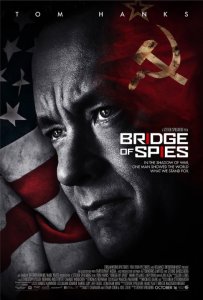 In Steven Spielberg’s “Lincoln”, the President worked nobly to free the slaves through the passage of the 13th Amendment, but in the context of the film his work was a thankless task, controversial and even reviled. What’s more, the film’s signature set piece, the Congressional vote, was a simple re-enactment of political theater but played for the biggest suspense on the grandest stage.
In Steven Spielberg’s “Lincoln”, the President worked nobly to free the slaves through the passage of the 13th Amendment, but in the context of the film his work was a thankless task, controversial and even reviled. What’s more, the film’s signature set piece, the Congressional vote, was a simple re-enactment of political theater but played for the biggest suspense on the grandest stage.
Spielberg’s follow up “Bridge of Spies” is a Cold War drama that follows a character with a similar plight. James B. Donovan (Tom Hanks) is a pariah, a man without a country despite working on behalf of it, and his job is equally simple and thankless: defend the rights of a Soviet Spy and negotiate his exchange. As he did with “Lincoln”, Spielberg is taking the small-scale conflicts and telling them writ large, with all the style and Hollywood storytelling of any of his more ambitious action or sci-fi films. “Bridge of Spies” may be the story of a humble, average American insurance lawyer, but it isn’t modest, and the film’s simplicity is exactly the point.
Donovan is tasked with defending Rudolf Abel (Mark Rylance) in court after he’s captured and outed as a spy for the Soviet Union. Hanks plays Donovan with the same spark as James Stewart in “Anatomy of a Murder,” a man with principles and values but not without an attitude and the ability to tell off a CIA agent who demands to know what Abel has been telling him. Twice Donovan invokes people as cowardly for shirking their responsibility to the American justice system. He’s a boy scout, but he’s often on the offensive.
Abel on the other hand is without emotion, soft-spoken and displaying no fear or worry in his conversations with Donovan, and the two have an awkward chemistry that Spielberg feeds off of. Everything in “Bridge of Spies” is simple and straight-forward in its discussion of politics, and Spielberg hones in on the awkward silence that drives their understanding of one another.
Abel is inevitably convicted, but Donovan successfully helps him avoid the death penalty by hinting at the possibility of a trade of spies between the Russians and the Americans. After a spy pilot goes down in Russian territory, Donovan is whisked away to the far side of the Berlin Wall, which we see actually being constructed, in order to negotiate the exchange.
For all its Cold War theatrics, including one thrilling action sequence involving the crash landing of the American spy pilot, “Bridge of Spies” is for the most part a courtroom drama, the stuff of conversation, negotiation and debate. Spielberg, working from a screenplay by the Coen Brothers and Matt Charman, never incorporates elaborate chases or thriller set pieces to complicate the core tension of whether this one man will win his freedom. Spielberg finds the most drama in how Donovan can talk his way out of tight spots, like when his German counterpart parks him in front of border patrol agents as a negotiating tactic. And when “Bridge of Spies” reaches its climax of the actual exchange, the simple act of just walking across the bridge has all the suspense of the voting sequence in “Lincoln”.
Janusz Kaminski’s cinematography is calm and more classical in its lengthier shot lengths and composition. But it has a lush look full of deep blues and gets more ragged and handheld as Donovan navigates his way through East Berlin. Thankfully his work here is more understated than the “Gone with the Wind” artificiality of “War Horse” (still a gorgeous film in its own right), but “Bridge of Spies” still has that Old Hollywood quality that can make it timeless.
At the film’s close, Donovan looks out the train window into Brooklyn and sees a specter of the demons he witnessed in East Berlin of children clambering over a fence in desperation. At that moment we learn his hardships are just beginning. The real Donovan went on to negotiate the exchange of countless more spies that could arguably cement his contribution as an American hero, but with “Bridge of Spies” Spielberg has the audacity to tell the story of just one.
3 ½ stars
1 thought on “Bridge of Spies”